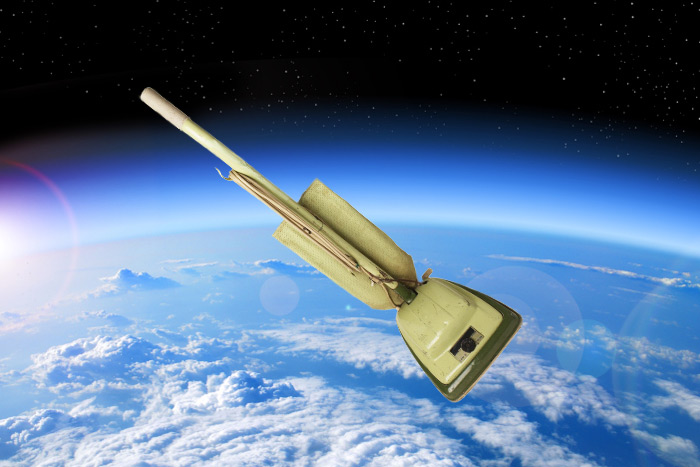Climate Change Solution: Clean the Atmosphere

I have been puzzled by the fact that there is no worldwide effort to find a way to get all the carbon dioxide out of the atmosphere. It’s been said that the amount of carbon dioxide in the atmosphere is so many billion tons that it would be a monumental task to somehow neutralize it.
So I’ve come up with a solution myself. I really think this is practical. Years ago, people were concerned about space debris, the stuff that we send up to monitor the weather or look at the stars that, after a while, ceases to be useful. It just keeps going around and around.
Here’s my plan. We get together with all the countries that have the capability to shoot small metal capsules up into space, and agree to all build small and simple space capsules that could circle the earth for dozens of years. These capsules would have filters on the front, similar to filters you see in vacuum cleaners, air cleaners and clothes dryers. As the capsules go around and around endlessly, the carbon dioxide gets caught up in the filters and is removed from the atmosphere. With a lot of these, the carbon dioxide would be rounded up on a massive scale in very short order.
Each of these capsules would be built with mechanical triggers inside that could be activated by signals from a space center. With one signal, the filter would be ejected from the capsule toward the ground. Gravity would soon assist it, and a small parachute would open and take it the rest of the way. With another signal, a second filter that was behind the first, would click into place to replace the first. There could be a dozen or more filters waiting to be used inside like this. In the end, when empty, the capsule would burn up in the atmosphere and that would be the end of it.
The key to this of course is that the capsules circle the earth effortlessly, fast and without fuel, for years and years. The other key is that we have filters that remove carbon dioxide. Yes, we do.
In the end, the filters would parachute down and we would make sure they arrive on land, not in the sea, by signaling the eject device at the appropriate moment. There might be a lot of them. But they would not be heavy enough to injure anybody. Instead, people could round them up and bring them to collection stations, in the same way we bring in soda bottles for recycling. The people could be compensated. In the collection stations, the filters would be cleaned and sent off to do the job again, while the removed carbon dioxide would be simply buried down where we got carbon in the first place—into the Earth. That is real recycling.
Thus we will save Florida. But we will have to act fast.



